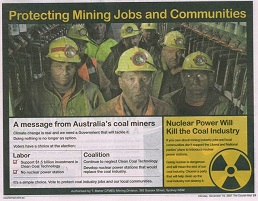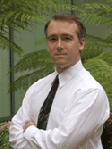Persistent Prejudice Against Nuclear – Can Anything Be Done? Part I
Last month I reported on court victories on the nuclear waste issue. While such victories are welcome, in my view things are not going well overall for the industry, and it's not clear the situation will improve much in the future unless some things change.
I've often spoken about the unlevel policy/regulatory playing field that works against nuclear (where nuclear is held to standards that are orders of magnitude more strict than those imposed on competing sources). Some believe that the unlevel playing field is due to the power and influence, on government, of competing energy sources, and I believe that there may be some truth to that. However, I've also come to believe that such policies are the result of deep prejudices against nuclear power (and nuclear pollution, relative to other forms of pollution) that are held by many, if not by most of the public. (Whether or not the influence of competing sources is responsible for the public prejudice, as well as unfair policy, is another debatable topic.)
Requirements on nuclear, aimed at avoiding even a small chance of the release of pollution, are absurdly strict because (as Japan shows) the public is completely intolerant of nuclear pollution, while they appear to care relatively little about continual, and far more harmful, pollution by other industries and energy sources. An argument that we must do everything possible (at all cost) to prevent significant releases of radioactivity because the public reaction may destroy the industry is actually hard to dismiss. Unfortunately, it appears that those same efforts are pricing nuclear out of the market, and are even more surely leading to its demise. (We are essentially left to pray for the outlawing of coal [essentially] as part of a global warming policy, along with a huge increase in natural gas prices in the future. Either that or some mandate for non-fossil sources that includes nuclear, such as a Clean Energy Standard.)
Thus, it seems to be a Catch-22 situation. The bottom line appears to be that it is difficult if not impossible for an energy source to survive in the marketplace if substantial public prejudice against it exists. In Part 1 of this essay, I will illustrate, through several examples, the tremendous prejudice that the public, all over the world, holds against nuclear power (and any pollution that could possibly result from it), compared to other energy sources and/or sources of pollution. In Part 2, I will explore what may possibly be done to address this seemingly intractable situation.
Residents of (polluted) Beijing run for cover after Fukushima
 News reports showed that many Beijing residents panicked in response to the Fukushima event, scurrying for shelter, buying up radiation detection equipment and medicines. This, despite the fact that the plant was over a thousand miles away, downwind. Also despite the fact that Beijing's air pollution represents a continuous, ongoing risk that is millions of times larger than any that could possibly result from Fukushima; enough to shorten the average resident's life span by ~15 years (and over 5 years in Northern China overall). Despite the overwhelmingly larger risk/impact from the air pollution, the public's response to that seems far more muted.
News reports showed that many Beijing residents panicked in response to the Fukushima event, scurrying for shelter, buying up radiation detection equipment and medicines. This, despite the fact that the plant was over a thousand miles away, downwind. Also despite the fact that Beijing's air pollution represents a continuous, ongoing risk that is millions of times larger than any that could possibly result from Fukushima; enough to shorten the average resident's life span by ~15 years (and over 5 years in Northern China overall). Despite the overwhelmingly larger risk/impact from the air pollution, the public's response to that seems far more muted.
Smoking parents in Fukushima won't let their children out to play
In Fukushima prefecture, many Japanese families with smokers are refusing to allow their children to play outside. This, despite the fact that most of those families live in regions where radiation levels are well within the natural range, and despite the fact that the risks from lack of exercise (obesity, etc..) as well as secondhand smoke are many orders of magnitude larger than any risks from Fukushima radiation.
Baseless refusal to eat fish
People in Japan and throughout the Orient are refusing to eat fish caught anywhere near Fukushima, regardless of what the doses are or how thoroughly the fish have been checked. There are even scare stories about fish caught throughout the Pacific, even on the US west coast. This, despite the fact that doses from any Fukushima isotopes (in local fish that pass the tests, and in any non-local fish) are orders of magnitude lower than those that occur from naturally-occurring isotopes in the fish.
Japan reacts to Fukushima by lowering the acceptable concentrations of radio-isotopes (man-made only!). That, of course, is having a reverse impact and is actually increasing fears, as it basically told the people that radiation is more dangerous, and it results in more fish failing any tests. Meanwhile, larger health risks from non-nuclear related pollutants in fish, such as mercury, are relatively ignored, with no rigorous testing of fish for those toxins, and little public reluctance to avoid fish due to their presence.
Japan decides to use fossil fuels instead of nuclear
In response to an event at one plant, as a result of an unprecedented, biblical, ~1000-year pair of natural events (9.0 earthquake and huge tsunami), Japan decides to shut down all its nuclear plants and replace them with fossil-fueled power generation, including coal. This is done in the name of "public health and safety," and advocates for resuming nuclear generation are accused of valuing economics (and profit) over public health and safety.
This, despite the fact that those fossil sources represent public health risks and environmental impacts that are thousands of times higher than any related to Japan's nuclear plants. Fukushima caused no deaths and is projected to have no measurable public health impacts, whereas (worldwide) fossil fuel use causes ~5000 deaths every single day. But, alas, expert opinion on the relative risks of nuclear vs. fossil generation are ignored by the public. The Japanese fossil-fueled power generation used to replace their nukes will likely result in thousands of Japanese deaths every year, as well as inflicting enormous economic costs and greatly increasing CO2 emissions. Japan has recently stated that it will be giving up on most of its emissions reduction goals.
Fukushima decontamination vs. cleaning up Beijing's air
 The Japanese are considering trying to cleanup the large parts of Fukushima region down to a level of 100 mrem/year, at enormous cost. This, despite the fact that 100 mrem/yr is ~1% of the radiation level at which any significant health impacts are clearly seen. It's not clear that there's ever been such an example of spending so much money for so little (if any) public health benefit. Meanwhile, other means of reducing public health risks and environmental impacts (such as reducing air pollution in Beijing, perhaps?) that would yield thousands to millions of times as much benefit per dollar spent still haven't been done.
The Japanese are considering trying to cleanup the large parts of Fukushima region down to a level of 100 mrem/year, at enormous cost. This, despite the fact that 100 mrem/yr is ~1% of the radiation level at which any significant health impacts are clearly seen. It's not clear that there's ever been such an example of spending so much money for so little (if any) public health benefit. Meanwhile, other means of reducing public health risks and environmental impacts (such as reducing air pollution in Beijing, perhaps?) that would yield thousands to millions of times as much benefit per dollar spent still haven't been done.
Even under the linear no-threshold (LNT) assumption, reducing dose rates in the (rural) area around Fukushima to 100 mrem/year (vs., say, 1000 mrem/year) is orders of magnitude less cost effective than countless other potential environmental initiatives, given the low health risks involved and the small affected population.
Even Korea? - Say it ain't so
Even Korea, which has a strong nuclear program and had plans for getting increasing shares of its power generation from nuclear, has started to drink the Kool-Aid. In response to a scandal involving falsified QA paperwork, it is now planning on reducing nuclear's future share of power generation, and using fossil fuels instead. Never mind the fact that the fossil-generated power will be orders of magnitude more dangerous and harmful (regardless of the QA issues). Instead of correcting the problem, and punishing those involved, the Koreans will decide to punish their people, and environment, by using more fossil fuels in lieu of nuclear.
Poor developing countries - Dirty coal OK - Nuclear, No!
Coal is actually the world's fastest growing energy source. Coal-plant pollution control requirements are also far more lax in the developing world. Global warming concern? Forget it!
One reason for coal's growth is that coal-fired power generation with lax pollution controls is cheap, and poor developing countries can't afford to spend significantly more money on cleaner generation sources that are more expensive. Those nations, and their poor populations, are more focused on cost than risks from air pollution (relatively speaking).
Those (above) concepts don't appear to apply to nuclear. Compromises on nuclear safety to reduce cost would never be allowed, by either the international community or the public in those nations. Polls show significant opposition to nuclear in the developing world, even in nations that get most of their power from highly polluting coal plants. There is often significant resistance, in poor nations' populations, even to nuclear projects that will be held to high standards, while there seems to be relatively little public pressure to reduce coal plant pollution. Those populations seem to have no sense of the level of hypocrisy involved. (Nor do Australians.)
No reason to worry - Radiation was not from nuclear industry
This article discusses a YouTube video where someone measured radiation levels of almost 1000 mrem/year on a beach near San Francisco. Local authorities quickly investigated and pointedly assured the public that while radiation levels were indeed elevated (several times over the expected natural background levels), they were from naturally occurring radioactive material (NORM), specifically, thorium and radium isotopes. They said that the sand with elevated radium and thorium concentrations may be natural, or may have been due to an oil pipeline that used to be in the area.
Of interest is the fact that the main theme of the communications from local authorities was not that there were elevated radiation levels, or how high they were, but the fact that the radiation was NOT from Fukushima. Apparently, that's all that matters. They went on to tell the public that the level of radiation is not a concern, and that the beaches are still safe. Just don't let your children eat the sand. I can't say I blame them. Public attitudes are such that this IS all that matters. Can you imagine the reaction if there were ~1000 mrem/year locations on a California beach that were due to Fukushima (Cs-137)? There would be panic. Bedlam. But hey, no, there's nothing to worry about. You can go on with your lives. No response necessary. The radiation did not come from the nuclear industry. Just the oil industry, perhaps. It's always been there (which makes it OK?).
Nuclear industry jobs - The only ones that don't matter?
 Many politicians have gone to the mat to prevent even the most reasonable coal and oil pollution regulations, in order to preserve coal industry jobs in their states. Indeed, based on the numbers, they appear to be willing to accept over 13,000 American deaths every single year, as well as global warming, in order to preserve (some) jobs in an industry that employs a total of ~83,000 (coal mining) jobs.
Many politicians have gone to the mat to prevent even the most reasonable coal and oil pollution regulations, in order to preserve coal industry jobs in their states. Indeed, based on the numbers, they appear to be willing to accept over 13,000 American deaths every single year, as well as global warming, in order to preserve (some) jobs in an industry that employs a total of ~83,000 (coal mining) jobs.
Meanwhile, with the exception of complaints by some local politicians after a local nuclear plant closes, no such support is given to the nuclear industry, or any related jobs. In the case of San Onofre in California, the state's congressional delegation did nothing or actually acted to get the plant closed. The message: Don't let the door hit you on the way out. The (more than 2000) plant jobs be damned. They also showed little concern for the air pollution, global warming, and power cost implications of closing the plant.
I personally have never seen any higher-level politicians make arguments in support of the nuclear industry (overall) on the basis of jobs that it would create, or preserve. (Local politicians have extolled the jobs created by existing, local projects.) I hear such arguments all the time for just about all other sources. It's almost as if nuclear industry jobs are uniquely invisible. It's as if they (we) don't matter.
Political opposition to fossil regs - Not nuclear regs
In addition to the jobs angle, the fossil industry in general receives far more political support than nuclear.
A large amount of opposition, among politicians and the public, has arisen against global warming efforts and pollution reduction efforts in general. Despite what scientists say, a large fraction of the public and politicians have simply decided that they do not believe in global warming, or that they are unwilling to do anything about it. Also, even the most reasonable air pollution regulations (that EPA analyses show to cost only on the order of $10,000 per life saved) are strongly opposed.
Political and public debate focuses only on the costs (i.e., the "destruction" of the coal industry, job losses, small increases in power costs, etc.), and rarely discusses any benefits (e.g., over 13,000 lives saved annually, reduced CO2 emissions). All it is, is a "war on coal." That is how they've managed to frame the debate. No attempt is made to address or challenge the scientific studies showing horrendous impacts of fossil fuel pollution. It's simply ignored, and not discussed.
On the nuclear side, almost the exact opposite is true. All discussions focus only on safety, while cost matters little. Despite the fact that nuclear regulations, overall, are orders of magnitude less cost effective, on a dollars-per-life-saved basis, it's almost blasphemous to suggest any reductions in nuclear requirements (i.e., safety) in order to reduce power costs, let alone to allow the industry to survive or to save nuclear jobs.
Post Fukushima NRC regulations
Unlike fossil regulations, there is almost no high-profile political resistance to strict nuclear regulations. In the United States, the Nuclear Regulatory Commission is ratcheting up nuclear regulations/requirements even further, in response to Fukushima, despite the fact that Fukushima showed that the consequences of a worst-case, full meltdown accident are vastly smaller than had always been assumed. Those assumptions (thousands of immediate deaths plus tens of thousands of eventual deaths) are what formed the basis and justification for the extremely strict regulations and requirements that had been placed on nuclear before Fukushima. The rational response would be to discuss what requirements could be responsibly relaxed. But the public will likely never tolerate any such discussion.
EU state aid rules
The European Union may not allow Britain to decide to use nuclear, even if it wants to. The reason is that any support (subsidy) for nuclear may constitute illegal "state aid." The idea is that different energy sources should be allowed to compete on a fair playing field, and member states should not be allowed to favor one industry over another.
However, massive subsidies, or outright mandates, for renewables are exempt from those rules. Thus, it's pretty clear that it's actually about political popularity, and not any real, objective principles. Furthermore, how can banning nuclear, by any member state, not be considered a form of state aid for competing (most notably fossil) energy sources? Not exactly allowing nuclear to compete, is it? It also must be understood that regulations can affect the market every bit as much as subsidies can. How can holding nuclear to standards thousands of times higher, in terms of dollars-per-life-saved (or per unit of environmental impact avoided), than fossil fuels not be considered a form of state aid?
Nuclear impacts intolerable - No credit for benefits
The general problem nuclear faces is that it is essentially required to be non-polluting energy source, where even a small chance of pollution must be avoided almost regardless of cost. But then, policy (in most countries) treats it as though it were a dirty source. Unlike other clean sources (e.g., renewables) it is required to compete directly with dirty sources that are allowed to pollute the environment, cause global warming, and inflict enormous public health impacts, for free. No credit at all, financial or otherwise, is given for nuclear's non-polluting, non-CO2 emitting nature. With the exception of a handful of new plants (in the United States), nuclear receives none of the large subsidies or (more importantly) outright mandates that renewables receive.
Yes, it's prejudice
I've come to believe that the public attitudes and policies described above can be accurately described as prejudice. Like other forms or examples of prejudice, it is mostly baseless; not supported by facts or data. People are clinging to those attitudes no matter what the scientific community tells them. It essentially involves being intolerant of small "sins" (i.e., risks or impacts) from nuclear while freely accepting far larger "sins" from other energy sources or industries. In that respect, it resembles many other, historical forms of prejudice. Policy in this country, and elsewhere, is to hold nuclear to far stricter standards simply because people don't like it (as opposed to having any objective basis).
In my view, this situation is unacceptable. In addition to being unjust, I doubt that the industry will be able to succeed in such an environment. Whatever the source of this prejudice (competing industry propaganda, media bias, or lingering stigma from the bomb), it shows no sign of abating, for the foreseeable future. In Part 2 of this essay, I will explore what might possibly be done in response to this situation.
_________________________

Hopf
Jim Hopf is a senior nuclear engineer with more than 20 years of experience in shielding and criticality analysis and design for spent fuel dry storage and transportation systems. He has been involved in nuclear advocacy for 10+ years, and is a member of the ANS Public Information Committee. He is a regular contributor to the ANS Nuclear Cafe.


